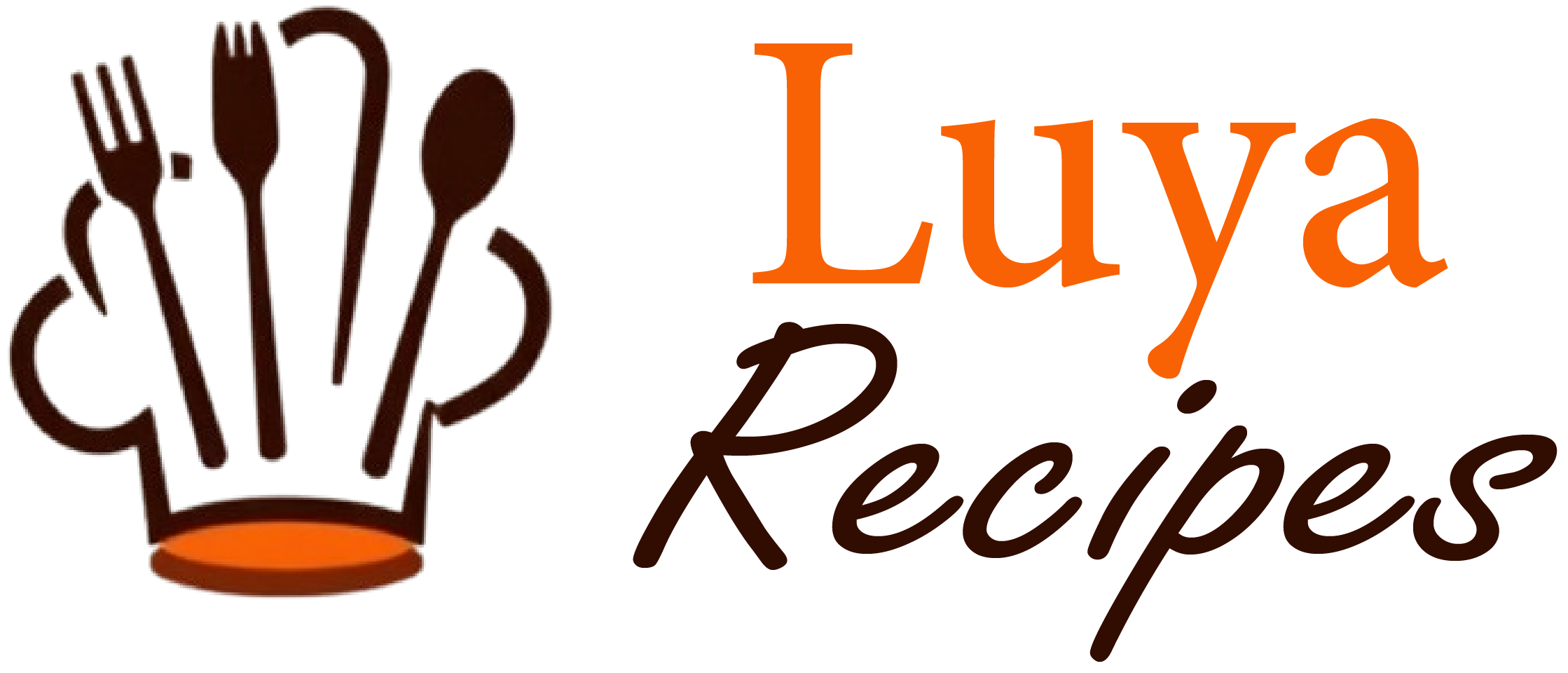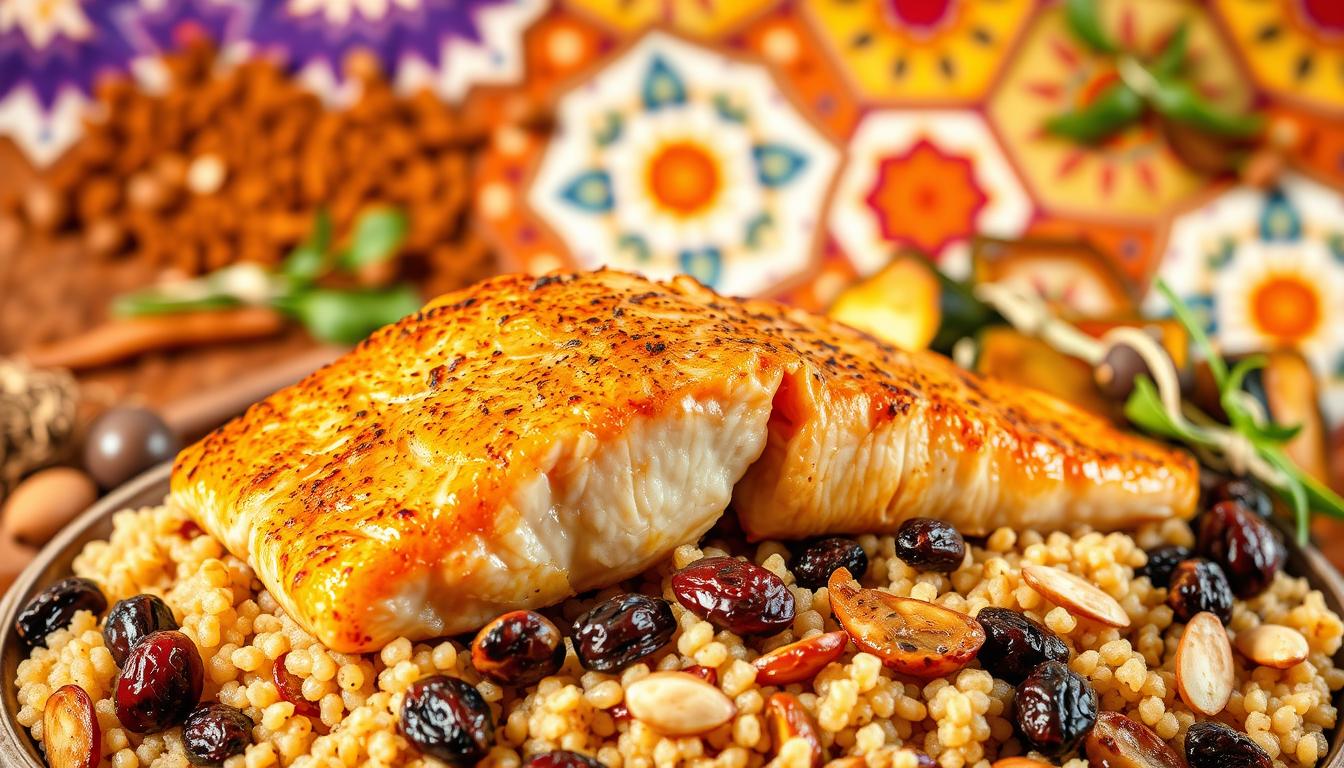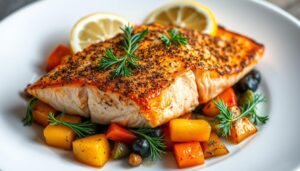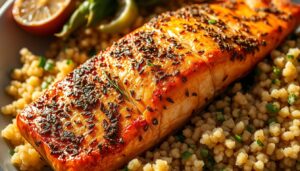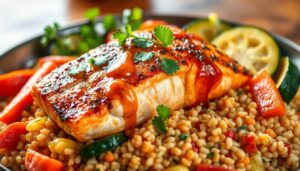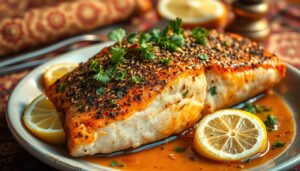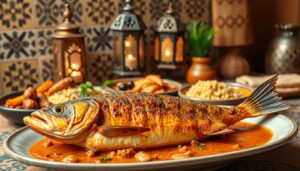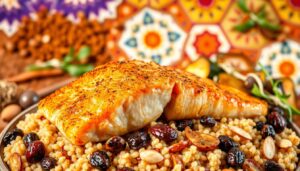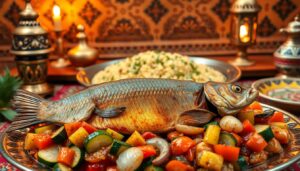Since I found Moroccan cuisine, my kitchen has changed. It’s now a place of adventure. Moroccan fish recipe salmon is more than food; it’s a journey through history.
Picture a dish that shows Morocco’s coastal beauty. It’s a Moroccan fish recipe salmon that mixes bold spices with tender fish. This dish connects your home to Marrakech’s markets.
Your journey to making a Moroccan fish recipe salmon starts here. It only takes 15 minutes to prepare and 45 minutes to cook. You’ll make a meal that feels like a trip to North Africa.
Table of Contents
Introduction to Moroccan Cuisine
Explore the vibrant world of Moroccan cuisine, where simple ingredients become extraordinary meals. Your journey into traditional Moroccan fish preparation starts with the rich cultural tapestry that makes these dishes special.
Moroccan cooking is an art form that celebrates complex flavors and time-honored techniques. An easy Moroccan salmon dish is more than a meal. It’s a sensory experience that connects you to centuries of culinary tradition.
Distinctive Culinary Characteristics
What makes Moroccan cuisine unique? Let’s look at the key elements:
- Intricate spice blends that create layered flavors
- Harmonious combination of sweet and savory ingredients
- Slow-cooking methods that develop deep, rich tastes
- Influences from Berber, Arabic, and Mediterranean cultures
The Symphony of Moroccan Spices
Spices are the heart of Moroccan cooking. They turn an ordinary easy Moroccan salmon dish into a memorable culinary adventure.
| Spice | Flavor Profile | Common Use |
|---|---|---|
| Cumin | Earthy, warm | Fish marinades |
| Paprika | Sweet, slightly smoky | Seasoning blends |
| Saffron | Delicate, floral | Signature rice dishes |
| Cinnamon | Sweet, warming | Meat and fish preparations |
“In Moroccan cooking, spices are not just ingredients—they are storytellers of culture and tradition.”
By understanding these fundamental elements, you’ll be ready to create authentic traditional Moroccan fish preparations. These dishes capture the essence of this remarkable cuisine.
Key Ingredients for Moroccan Salmon
To make a delicious Moroccan seafood recipe, you need the right ingredients. These should bring the true taste of the Mediterranean to your home. Knowing the key parts of your Moroccan salmon dish is crucial.
Fresh Salmon Fillets: The Star of the Dish
Start with top-quality salmon fillets. Look for fish that’s bright, firm, and has a vibrant color. Wild-caught salmon is the best choice for a rich flavor in your dish.
- 4 salmon fillets (6-8 oz each)
- Select fresh, skin-on fillets for best results
- Aim for salmon with minimal fishy odor
Essential Moroccan Spices
The secret to a great Moroccan seafood recipe is its spice mix. Your Moroccan salmon dish will shine with a blend of aromatic spices. These spices turn simple fish into a memorable meal.
| Spice | Quantity |
|---|---|
| Ground Cumin | 1 Tbsp |
| Sweet Paprika | 2 Tbsp |
| White Pepper | 1 tsp |
| Ground Cinnamon | 1/2 tsp |
Additional Ingredients You’ll Need
To finish your Moroccan salmon, add these ingredients. They enhance the dish’s depth and authenticity.
- 1/4 cup olive oil
- 6 garlic cloves, minced
- 1 large yellow onion, chopped
- Juice of one lemon
- Fresh cilantro for garnish
Pro tip: Always toast your whole spices before grinding. This releases their full flavor for your Moroccan seafood recipe.
Preparing the Salmon
Starting an authentic Moroccan salmon recipe means paying close attention to preparation. You need to thaw the salmon carefully and marinate it well. This makes the salmon go from frozen to flavorful.
Thawing salmon right is key to keep its texture soft and prevent bacteria. Here’s how to do it:
- Take salmon out of the freezer and put it in the fridge.
- Let it thaw for about 24 hours.
- Keep it in a sealed container to avoid moisture loss.
- Pat dry with paper towels before marinating.
Mastering the Marination Process
A great Moroccan spice blend turns ordinary salmon into a culinary delight. Your marinade should mix Moroccan flavors with the salmon’s richness.
Essential Marinating Ingredients
- 1/4 cup olive oil
- 2 Tbsp sweet paprika
- 1 Tbsp cumin
- 6 finely sliced garlic cloves
- 1 tsp salt
- 1 tsp white pepper
- Juice of one lemon
For a true Moroccan salmon recipe, marinate for 30-45 minutes. This lets the spices soak in without harming the salmon. Don’t marinate more than 1 hour to keep the fish tender.
Pro tip: Always marinate in a non-reactive glass or ceramic dish to preserve the salmon’s pristine flavor.
By using these steps, you’ll make your salmon a Moroccan culinary gem.
Cooking Techniques for Moroccan Salmon
Exploring different cooking methods can turn your moroccan fish tagine recipe into a masterpiece. Each method brings out unique flavors and textures in salmon. This makes your meal both delicious and authentic.
When preparing a baked moroccan salmon fillet, consider several key cooking approaches. These highlight the rich spices and delicate nature of the fish.
Grilling Moroccan Salmon to Perfection
Grilling salmon is a great way to add smoky flavors to your dish. Follow these steps for the best results:
- Preheat grill to medium-high heat
- Brush salmon with olive oil
- Season generously with Moroccan spice blend
- Grill for 4-5 minutes per side
- Ensure internal temperature reaches 120°F
Baking Salmon with Moroccan Flavors
Baking is a gentler method that keeps moisture in and spices deep in the fish. For an authentic moroccan fish tagine recipe approach:
- Marinate salmon in chermoula sauce
- Preheat oven to 400°F
- Place salmon in a ceramic or cast-iron dish
- Bake for 10-12 minutes
- Garnish with fresh herbs
Each cooking technique brings out different nuances in your salmon. This ensures a delightful Moroccan-inspired meal that will impress your guests.
Moroccan Vegetable Sides
Make your moroccan fish recipe salmon even better with authentic vegetable sides. These sides turn an easy moroccan salmon dish into a true culinary adventure. Moroccan cuisine loves vibrant side dishes that add rich, aromatic flavors to main courses.
Choosing the right vegetable sides can really boost your salmon’s taste. Moroccan cuisine has many tasty options that add warmth and depth to your meal.
Couscous: A Perfect Accompaniment
Couscous is a great match for your moroccan fish recipe salmon. This light, fluffy grain soaks up spices well and offers a nice texture contrast to the salmon.
- Prepare couscous with vegetable broth for added depth
- Season with cumin, coriander, and fresh parsley
- Toast couscous lightly before cooking for enhanced nutty flavor
Roasted Vegetables with Moroccan Spices
Roasted vegetables add a real Moroccan touch to your easy moroccan salmon dish. The right vegetables and spices can make your meal unforgettable.
| Vegetable | Spice Blend | Roasting Time |
|---|---|---|
| Zucchini | Ras el Hanout | 20-25 minutes |
| Bell Peppers | Harissa | 25-30 minutes |
| Eggplant | Cumin & Paprika | 30-35 minutes |
Roast vegetables at 425°F with olive oil and your chosen spice blend. The goal is to get caramelized edges while keeping the vegetables tender.
Popular Moroccan Fish Recipes
Moroccan cuisine is full of amazing fish dishes. These dishes show the rich food culture of North Africa. Seafood is a big part of these meals, adding incredible flavors.
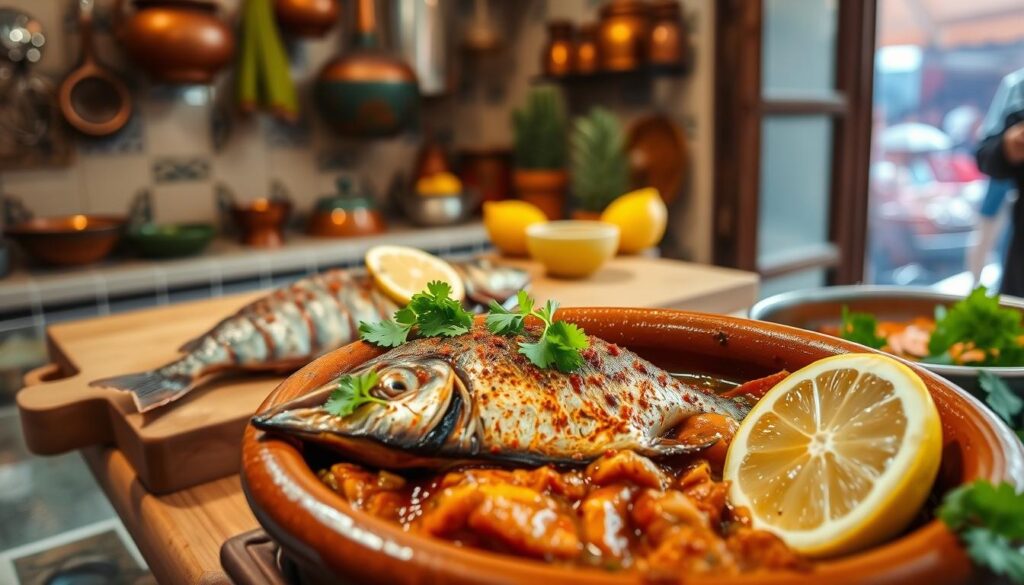
Let’s dive into two top Moroccan fish recipes. They will make your cooking even better:
Chermoula-Spiced Fish: A Flavor Explosion
Chermoula is key in Moroccan fish stews, including salmon. It’s a special mix of:
- Fresh cilantro and parsley
- Garlic and preserved lemons
- Cumin and paprika
- Olive oil
This marinade makes fish taste amazing. Marinating for 2-3 hours lets the flavors soak in. This makes the dish truly Moroccan.
Tagine: Slow-Cooked Seafood Perfection
The Moroccan tagine turns simple ingredients into a feast. Cooking in a clay pot makes salmon and veggies blend perfectly.
- Recommended fish: Salmon or white fish
- Cooking time: Approximately 40 minutes
- Serves: 6 people
- Key spices: Turmeric, ginger, black pepper
Exploring Moroccan seafood is a journey of taste. It brings the coast to your table.
Serving Suggestions for Moroccan Salmon
Creating the best Moroccan salmon recipe is more than just cooking. It’s about making a dish that excites all your senses. Your flavorful Moroccan seafood recipe should look as good as it tastes. It should show off the vibrant spirit of Moroccan cuisine.
- Use large, wide ceramic platters with warm earth tones
- Arrange salmon fillets in a slightly overlapping pattern
- Garnish with fresh cilantro and lemon wedges
- Sprinkle additional spices around the edges for visual appeal
Wine Pairing Recommendations
Choosing the right wine can make your Moroccan salmon recipe even better. The spices in this dish go well with certain wines.
- White Wines: Crisp Sauvignon Blanc or Pinot Grigio
- Red Wines: Light Pinot Noir or Grenache
- Rosé: Dry Provençal-style rosé
Pro tip: Serve wines slightly chilled to match the dish’s rich, spicy flavors. Your guests will love the thoughtful pairing that makes the meal even better.
Nutritional Benefits of Salmon
Salmon is a nutritional powerhouse in your authentic Moroccan salmon recipe. It offers many health benefits, making it more than just a tasty meal.
Omega-3 Fatty Acids: Your Heart’s Best Friend
Salmon is a top source of omega-3 fatty acids. These acids are key for heart health. Wild-caught Alaskan sockeye salmon has some of the highest omega-3 levels. Just one serving a week can help lower cholesterol.
- Reduces triglyceride levels
- Promotes healthy blood flow
- Prevents blood clots
- Supports brain function
Essential Vitamins and Minerals
Your moroccan fish recipe salmon is not just delicious—it’s full of vital nutrients. A typical serving offers impressive health benefits:
- Vitamin D: Helps prevent depression
- Selenium: Fights inflammation
- High-quality protein: Supports muscle recovery
- Boosts immune system
By adding this authentic Moroccan salmon recipe to your diet, you’re not just enjoying a meal. You’re also investing in your health and wellness.
Tips for a Successful Moroccan Meal
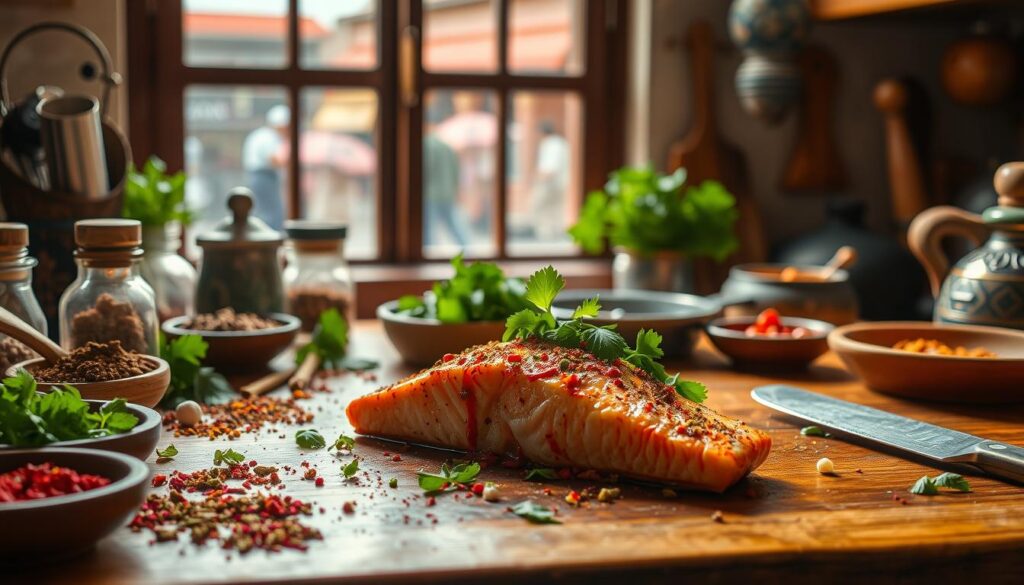
Making an easy Moroccan salmon dish is more than just a recipe. It’s about mastering flavor balance and timing. This way, you can create the best Moroccan salmon recipe.
Balancing Flavors Like a Pro
Moroccan food is known for its rich flavors. When cooking your salmon, keep these tips in mind:
- Blend sweet and savory spices carefully
- Use harissa for heat
- Balance spicy notes with citrus elements
- Incorporate fresh herbs like cilantro and parsley
Timing Your Culinary Adventure
Successful Moroccan cooking needs good timing. Here are key timing tips for your easy Moroccan salmon dish:
- Marinate salmon 30 minutes before cooking
- Prepare side dishes first
- Cook salmon at 400°F for 10-15 minutes
- Rest fish 3-5 minutes before serving
By following these tips, you’ll turn your kitchen into a Moroccan culinary haven. You’ll create a memorable and tasty salmon dish.
Cultural Significance of Seafood in Morocco
Morocco’s love for seafood is deep, blending food traditions with its identity. The country’s long coastline, over 3,500 kilometers, has shaped its seafood cooking ways.
Seafood is key in Moroccan food, showing the country’s varied landscapes and creative cooking. From lively coastal markets to family homes, fish is more than food—it’s a joy of sharing and taste.
Regional Seafood Variations
Coastal areas in Morocco have their own seafood cooking styles. Each spot has its own way of making dishes like salmon:
- Essaouira: Known for grilled sardines with chermoula
- Agadir: Specializes in spicy fish tagines
- Casablanca: Offers diverse seafood preparation techniques
Seafood Markets: Economic and Cultural Heartbeat
Moroccan fish markets are alive with food traditions and business. They show the country’s strong tie to the sea.
| Market Statistic | Details |
|---|---|
| Daily Fish Sales | Approximately 50 tons |
| Seafood Export Value | Over $1 billion annually |
| Fish Protein Contribution | 30% in coastal communities |
Exploring Moroccan seafood takes you on a journey. It’s where traditional moroccan fish preparation meets new tastes, inviting you to discover flavors steeped in culture.
Adapting Recipes for Different Dietary Needs
Making an easy Moroccan salmon dish doesn’t mean you have to give up flavor or dietary needs. With a few simple changes, your Moroccan fish recipe salmon can be enjoyed by people with different dietary restrictions.
Finding the right diet can be tough, but Moroccan food is very flexible. The traditional recipes often fit different eating styles well.
Gluten-Free Options
For those who can’t have gluten, there are easy swaps for your Moroccan salmon dish:
- Try quinoa or cauliflower rice instead of couscous
- Use gluten-free breadcrumbs for coating
- Make sure the spice blend is gluten-free
Dairy-Free Variants
Dairy-free folks can still enjoy Moroccan flavors with these options:
- Use coconut or almond yogurt instead of regular yogurt
- Choose olive oil over butter for cooking
- Try plant-based cream for sauces
| Dietary Restriction | Recommended Substitution |
|---|---|
| Gluten Sensitivity | Quinoa, Cauliflower Rice |
| Dairy Intolerance | Coconut Yogurt, Olive Oil |
Explore the flexibility of Moroccan cuisine by adjusting recipes for your dietary needs. Creativity is key in making delicious meals everyone can enjoy!
Conclusion
Your journey through this authentic Moroccan salmon recipe shows the vibrant world of Moroccan cuisine. It’s more than just a meal; it’s an invitation to culinary adventure. Each ingredient, from the aromatic cumin to the zesty lemon juice, tells a story of tradition and innovation.
Moroccan cooking celebrates personal creativity. Your kitchen becomes a canvas where traditional techniques meet individual inspiration. Feel free to experiment with spice combinations, adjust marinating times, or swap ingredients to suit your taste preferences. The beauty of this authentic Moroccan salmon recipe lies in its flexibility and adaptability.
Remember, cooking is about exploration and joy. The dish you’ve learned to prepare is not only delicious but also nutritious. With 22g of protein per serving and heart-healthy omega-3 fatty acids, it offers health benefits. Whether you’re grilling, baking, or trying alternative cooking methods, each attempt brings you closer to mastering the art of Moroccan cuisine.
Your culinary adventure doesn’t end here. Continue exploring the rich tapestry of Moroccan flavors, and let your creativity guide you through each delicious discovery. The world of spices, techniques, and ingredients is waiting for you to make your mark.
FAQ
What makes Moroccan salmon different from other fish recipes?
Moroccan salmon is special because of its mix of spices. It includes cumin, paprika, coriander, and preserved lemon. These ingredients give it a unique and vibrant taste that’s different from other seafood dishes.
How long should I marinate the salmon for the best flavor?
For the best taste, marinate the salmon for 30 minutes to 2 hours. Don’t marinate it for more than 2 hours. The acid in the marinade can damage the fish’s texture.
Can I make this recipe if I’m gluten-free?
Yes, you can! This Moroccan salmon recipe doesn’t have gluten. Just make sure to use gluten-free couscous or rice. Also, check that your spices are gluten-free.
What are the best side dishes to serve with Moroccan salmon?
Good sides include fluffy couscous and roasted veggies with Moroccan spices. You can also try a fresh herb salad or a light cucumber and tomato salad. These options go well with the salmon’s rich flavors.
Can I use frozen salmon for this recipe?
Yes, frozen salmon works too. Thaw it in the fridge overnight. Pat it dry and make sure it’s room temperature before marinating. This helps the spices stick and cook evenly.
What cooking methods work best for Moroccan salmon?
You can grill, bake, or cook the salmon in a tagine. Grilling adds a nice char. Baking cooks it evenly. A tagine gives a traditional Moroccan taste with steamed flavors.
Are there any dairy-free variations of this recipe?
The Moroccan salmon recipe is already dairy-free. Use olive oil instead of butter. Make sure your spices don’t have dairy. Serve it with dairy-free sides like vegetable couscous or rice.
What health benefits does this salmon recipe offer?
Moroccan salmon is full of omega-3 fatty acids. These are good for your heart and brain. The spices, like turmeric and cumin, also have anti-inflammatory properties and are full of antioxidants.
How can I adjust the spice level of the recipe?
To change the heat, adjust the hot paprika or add cayenne pepper. Start with a little and taste as you go. This way, you can find the spice level you like.
What wine pairs well with Moroccan salmon?
Sauvignon Blanc or a light Rosé wine go well with Moroccan salmon. If you prefer red, a light Pinot Noir can also complement the dish’s spices.
Source Links
- Moroccan Fish – Something Nutritious – https://somethingnutritiousblog.com/moroccan-fish/
- Easy Fish Dinner Recipes | The Mediterranean Dish – https://www.themediterraneandish.com/easy-fish-recipes/
- 15 Baked Salmon Recipes For Easy Weeknight Dinners – Tasting Table – https://www.tastingtable.com/1605233/baked-salmon-recipes/
- Easy One Pan Salmon and Roasted Mediterranean Vegetables – https://apriljharris.com/one-pan-salmon-and-mediterranean-vegetables/
- A Taste of Casablanca for Passover – Sephardic Spice Girls – https://sephardicspicegirls.com/moroccan-fish-a-taste-of-casablanca-for-passover/
- Spicy Moroccan Baked Fish – https://dishingouthealth.com/spicy-moroccan-baked-fish/
- Spiced Moroccan Fish using the Kamado Joe Karbon Steel Paella Pan – https://www.kamadojoe.com/fr/blogs/recipes/spiced-moroccan-fish-using-the-kamado-joe-karbon-steel-paella-pan?srsltid=AfmBOoruxQpLge2ostNFUB2etNPt11_onq9KA86RhgSZoQUidCMtFlUi
- Jewish Moroccan Fish Chraime Recipe – https://marocmama.com/moroccan-jewish-fish-chraime-recipe/
- 20-Minute Salmon Chraimeh (Fish Braised in Spicy Tomato Sauce) – Well Seasoned Studio – https://www.wellseasonedstudio.com/salmon-chraimeh/
- Moroccan Fish Tagine – Classic Fish Tagra Recipe – https://www.ahlanwasahlan.co.uk/classic-moroccan-fish-tagine-fish-tagra-recipe/
- Sea To Table – https://sea2table.com/blogs/news/health-benefits-of-sockeye-salmon?srsltid=AfmBOopaD0X94kdNXH9rK0YPBicSXMnRD33muW6CvcaHNbeyNIIvW5ZI
- Is Salmon Good for Cholesterol? – https://aksalmonco.com/blogs/learn/is-salmon-good-for-cholesterol?srsltid=AfmBOoqb7K39jyvoJuIECp9Ei23Mq5fKH37Wir-Ewcr15htLKcjX8-pO
- Best Fish to Eat: Top Guide Comparing Salmon, Tuna & Wahoo – https://kaimanajerky.com/blogs/news/best-fish-to-eat-top-guide-comparing-salmon-tuna-wahoo?srsltid=AfmBOoq_Pdxr6VESIiV75PjAtV9WRRbWLVDvEbtUz2YTAug0yjiH8k6Z
- Moroccan Stuffed Sardines – https://marocmama.com/moroccan-stuffed-sardines/
- 73 Seafood Dinner Ideas to Try Tonight – https://www.tasteofhome.com/collection/seafood-recipes-for-dinner/?srsltid=AfmBOoqIhXDpZnVIv2TQIpmgT80JJc0aAbjxCdZsmgilsxQfPvZQbil8
- Spicy Fish Meatballs – Something Nutritious – https://somethingnutritiousblog.com/spicy-fish-meatballs/
- Sheet Pan Baked Salmon And Vegetables | Good Food Discoveries – https://goodfooddiscoveries.com/sheet-pan-baked-salmon-and-vegetables/
- Grilled Dorado Fish Recipes: Moroccan Flavors for Perfectly – https://www.moroccanfoodie.com/grilled-dorado-fish-recipes/
- Fish Cake Recipe With a Moroccan Edge Amazingly Good – https://www.moroccanfoodie.com/fish-cake-recipe/
